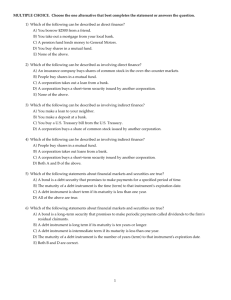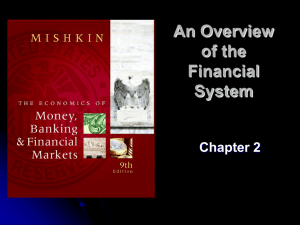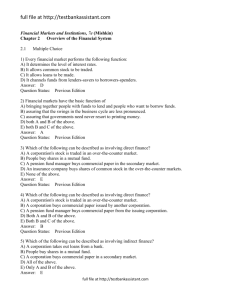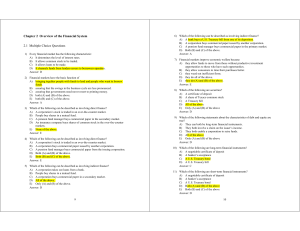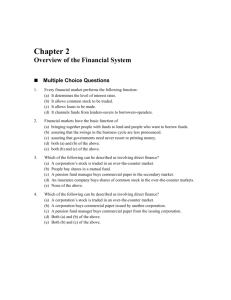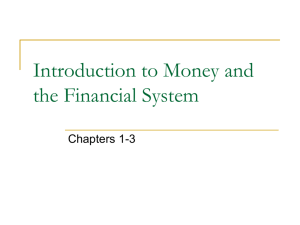File - BSC Economics
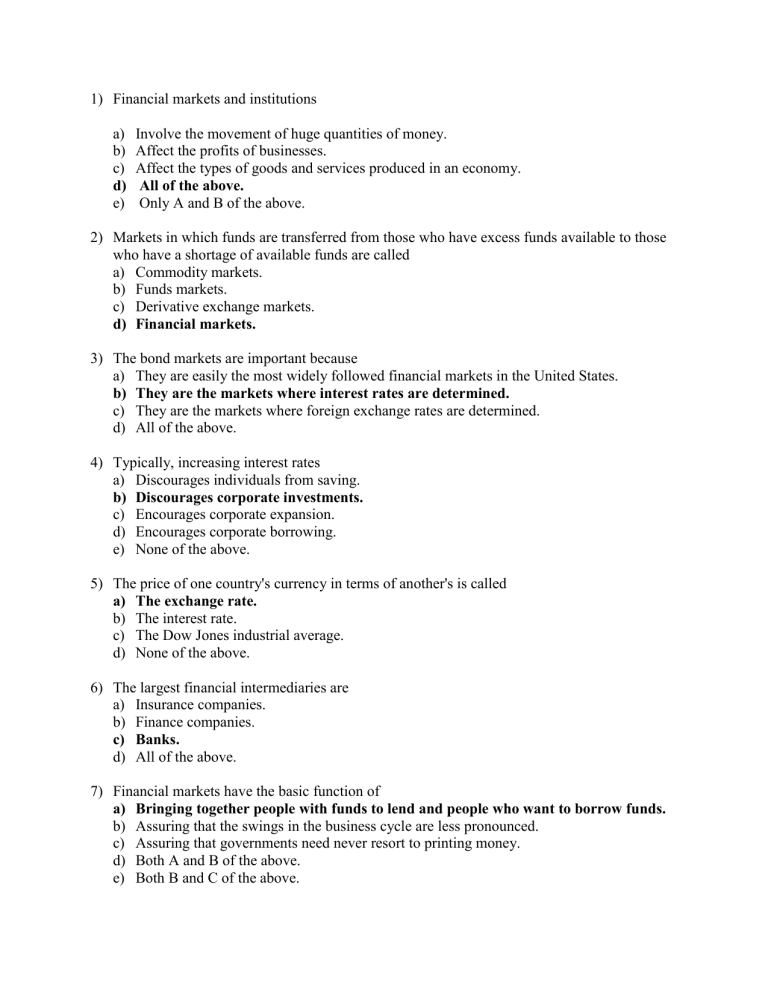
1) Financial markets and institutions a) Involve the movement of huge quantities of money. b) Affect the profits of businesses. c) Affect the types of goods and services produced in an economy. d) All of the above. e) Only A and B of the above.
2) Markets in which funds are transferred from those who have excess funds available to those who have a shortage of available funds are called a) Commodity markets. b) Funds markets. c) Derivative exchange markets. d) Financial markets.
3) The bond markets are important because a) They are easily the most widely followed financial markets in the United States. b) They are the markets where interest rates are determined. c) They are the markets where foreign exchange rates are determined. d) All of the above.
4) Typically, increasing interest rates a) Discourages individuals from saving. b) Discourages corporate investments. c) Encourages corporate expansion. d) Encourages corporate borrowing. e) None of the above.
5) The price of one country's currency in terms of another's is called a) The exchange rate. b) The interest rate. c) The Dow Jones industrial average. d) None of the above.
6) The largest financial intermediaries are a) Insurance companies. b) Finance companies. c) Banks. d) All of the above.
7) Financial markets have the basic function of a) Bringing together people with funds to lend and people who want to borrow funds. b) Assuring that the swings in the business cycle are less pronounced. c) Assuring that governments need never resort to printing money. d) Both A and B of the above. e) Both B and C of the above.
8) Which of the following can be described as involving direct finance? a) A corporation's stock is traded in an over-the-counter market. b) People buy shares in a mutual fund. c) A pension fund manager buys commercial paper in the secondary market. d) An insurance company buys shares of common stock in the over-the-counter markets. e) None of the above.
9) Which of the following can be described as involving direct finance? a) A corporation's stock is traded in an over-the-counter market. b) A corporation buys commercial paper issued by another corporation. c) A pension fund manager buys commercial paper from the issuing corporation. d) Both A and B of the above.
10) The money market is the market in which _________ are traded. a) new issues of securities b) previously issued securities c) short-term debt instruments d) long-term debt and equity instruments
11) Which of the following are secondary markets? a) The Karachi Stock Exchange b) The Pakistan government bond market c) The over-the-counter stock market d) All of the above
12) Intermediaries who are agents of investors and match buyers with sellers of securities are called a) Investment bankers. b) Traders. c) Brokers. d) Dealers. e) None of the above.
13) Bonds that are sold in a foreign country and are denominated in that country's currency are known as a) Foreign bonds. b) Eurobonds. c) Eurocurrencies. d) Eurodollars.
14) Which of the following financial intermediaries are depository institutions? a) A savings and loan association b) A commercial bank c) A credit union
d) All of the above
15) Banks providing depositors with checking accounts that enable them to pay their bills easily is known as a) Liquidity services. b) Asset transformation. c) Risk sharing. d) Transaction costs.
16) Monetary policy is chiefly concerned with a) How much money businesses earn. b) The level of interest rates and the nation's money supply. c) How much money people pay in taxes. d) Whether people have saved enough money for retirement.
17) A security a) Is a claim or price of property that is subject to ownership. b) Promises that payments will be made periodically for a specified period of time. c) Is the price paid for the usage of funds. d) Is a claim on the issuer's future income.
18) Long-term debt and equity instruments are traded in the _________ market. a) primary b) secondary c) capital d) money
19) The purpose of diversification is to a) Reduce the volatility of a portfolio's return. b) Raise the volatility of a portfolio's return. c) Reduce the average return on a portfolio. d) Raise the average return on a portfolio.
20) Which of the following is a contractual savings institution? a) A life insurance company b) A credit union c) A savings and loan association d) A mutual fund
21) An example of direct financing is if you were to lend money to your neighbor. a) True b) False
22) The Karachi Stock Exchange is an example of a primary market. a) True b) False
23) Equity represents an ownership interest in a firm and entitles the holder to the residual cash flows. a) True b) False
24) The capital market is a financial market in which only short-term debt instruments (generally those with original maturity of less than one year) are traded. a) True b) False
25) Monetary policy affects interest rates but has little effect on inflation or business cycles. a) True b) False
26) A financial intermediary borrows funds from people who have saved. a) True b) False
Prepared by:
Rizwan Hussain
Tasawor hussain

